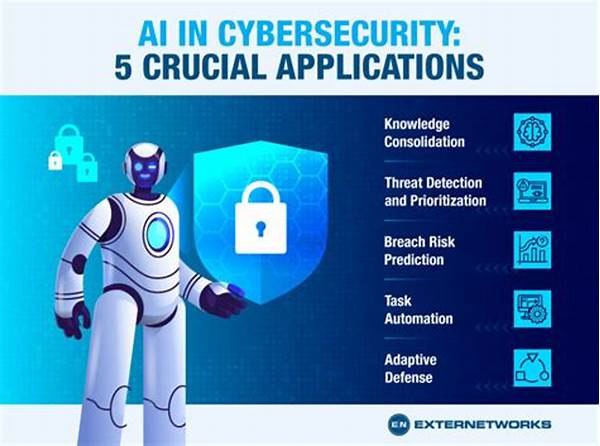In the rapidly evolving landscape of digital technology, the sophistication of cyber threats continues to escalate. Traditional cybersecurity measures, while still essential, are often no longer sufficient to combat the increasingly complex attacks. This is where AI cybersecurity tools become pivotal. Imagine trying to fend off an army with a shield alone, while the enemy uses drones and advanced weaponry. It’s a losing battle without some serious upgrades. That’s exactly why AI cybersecurity tools are crucial; they equip your defense systems with the intelligence to predict, detect, and neutralize threats before they can cause damage.
Read More : Best Ai Use Cases Across Industries
AI, or Artificial Intelligence, brings to the table an unparalleled ability to process massive amounts of data at lightning speed, identify patterns, and even anticipate future threats. It’s not just about reacting to digital threats but proactively managing them. For instance, a business owner might feel secure with a basic firewall and antivirus software, believing that these tools are sufficient for their protection. However, what happens when a new type of malware, designed to sneak past these defenses, targets their network? This is where AI shines, utilizing machine learning to detect anomalies and recognize the behavior of potential threats, ensuring proactive defense.
Now, isn’t that an exclusive service every business would want? It’s like having an elite bodyguard that never sleeps, always learning and adapting to new threats. Why AI cybersecurity tools are crucial is because they provide a dynamic and adaptive layer of security that static tools simply can’t match. And let’s not forget the cost savings; by preventing breaches before they occur, businesses save not just money, but also their reputations and client trust.
The Role of AI in Modern Cybersecurity
Let’s dive deeper into why AI cybersecurity tools are crucial and how they function in today’s tech-driven world. AI’s role is not just limited to reactive measures but extends to predictive analytics. Imagine foreseeing a possible security breach weeks before it happens and taking preventive steps to stop it. That’s the sort of capability AI tools offer.
In addition to prediction, AI-enhanced cybersecurity tools aid in incident response. When threats do slip through the cracks, AI can help map out the attack vectors, assess the damage, and recommend actions to mitigate any further risks. The insights derived from AI can inform strategies to bolster the existing security frameworks, making them more robust against future threats.
Moreover, AI tools are crucial in automating mundane yet critical tasks such as monitoring network activity and data logging. This vastly reduces the workload on human analysts, allowing them to focus on more complex decisions that require human intuition and creativity. Consequently, it increases efficiency, reduces errors, and enhances the overall security posture of organizations.
How AI Detects and Fights Cyber Threats
When dissecting why AI cybersecurity tools are crucial, it’s important to understand the ‘how.’ AI tools use a variety of techniques, such as machine learning algorithms, which allow them to learn from past data to predict future events. These algorithms can identify even the minutest anomalies in network traffic, often indicative of a looming cyber threat.
Another exciting feature of AI in cybersecurity is Natural Language Processing (NLP). This allows AI tools to parse and understand human language, which can be instrumental in monitoring communications for potential insider threats or phishing attempts. NLP can screen through emails and flag anything that seems suspicious, ensuring that no malicious link slips through to unsuspecting employees.
AI’s ability to continuously learn and adapt makes it an indispensable tool. With every new threat encountered, AI becomes more capable of tackling even more sophisticated threats in the future. It’s akin to having a superhero that grows stronger with each challenge, ensuring your defenses are always one step ahead.
Six Reasons Why AI Cybersecurity Tools Are Crucial
In-Depth Understanding of AI Cybersecurity Tools
Understanding the Mechanisms
In pursuit of comprehending why AI cybersecurity tools are crucial, diving into their mechanisms is essential. AI employs machine learning to become familiar with normal behavior within a network. By establishing a baseline, any deviation can be quickly identified as potentially dangerous. This comparison with normalcy lets AI rapidly flag unknown threats, sometimes before they fully execute.
Support Vector Machines and Neural Networks are among the algorithms employed. They sort through massive sets of data, learning the differences between benign and malicious activities. This kind of knowledge enables accurate predictions about potential risks and attacks.
How AI Makes a Difference
This remarkable ability to process data and learn from it is transformative for cybersecurity. For example, ransomware, one of the most devastating types of attacks, presents a classic scenario where AI can save the day. While traditional systems may struggle to recognize unknown ransomware signatures, AI excels by detecting deviations from usual data access patterns, halting the ransomware before it locks down crucial files.
Consider a bank facing thousands of transactions per minute, making it a perfect avenue for cybercriminals. AI tools ensure such financial institutions can detect fraudulent transactions swiftly, without interrupting legitimate business operations. It’s like having a 24/7 security team that never tires, a true game-changer in the digital environment.
AI-Cybersecurity: Beyond Human Capabilities
While human intervention remains pivotal in cybersecurity, relying on humans alone is increasingly impractical. The volume of data and speed required for modern cybersecurity far surpass human capabilities. AI fills this gap marvelously by continuously reviewing and analyzing data in real time, something human analysts cannot do around the clock.
AI tools also collaborate seamlessly with human analysts, making recommendations on issues requiring human intuition or ethical judgment. Even the best AI cannot replicate the nuanced decision-making skills of a human completely; instead, it amplifies human input to the scales needed for today’s cybersecurity requirements. This synergy speaks to why AI cybersecurity tools are crucial in defending digital landscapes from malicious incursions.
In summary, it is evident why AI cybersecurity tools are crucial. They enhance traditional security measures, automate the mundane, and arm businesses with proactive defenses against ever-evolving threats. Embracing these tools means staying ahead in the ongoing battle against cybercrime, a feat that is now more achievable and economically viable than ever before.


